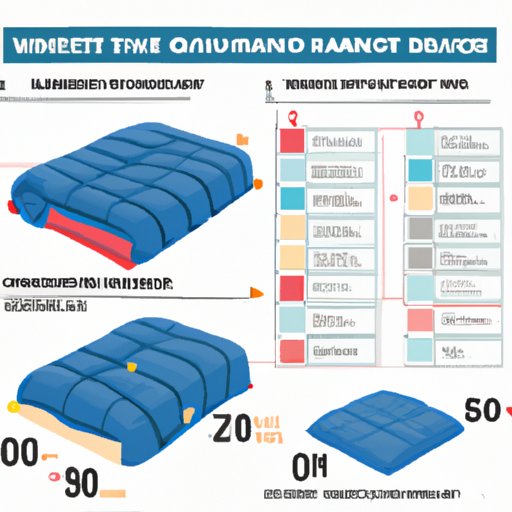Introduction
Weighted blankets are special blankets that are filled with a material such as plastic pellets, glass beads or metal shots to provide extra pressure and comfort when sleeping. They are often used as an alternative to conventional bedding to help people relax and improve their sleep quality. As such, it is important to select an appropriate weighted blanket that suits your individual needs and preferences.
The purpose of this article is to explore how much a weighted blanket should weigh, taking into account factors such as age groups, scientific studies, customer reviews, materials used, size of the blanket and potential health risks. Additionally, this article will compare the benefits of using a weighted blanket with a regular blanket.

Interviewing Sleep Experts on the Ideal Weight for a Weighted Blanket
When selecting a weighted blanket, there are a few factors to consider. According to experts in the field of sleep science, the ideal weight of a weighted blanket should be between 5-15% of the user’s body weight. For example, if the user weighs 140 pounds, then the optimal weight of the blanket should be between 7-21 pounds.
It is also important to take into account the age group of the user. Generally speaking, younger children should use a lighter weighted blanket, while adults can use a heavier one. For instance, a blanket for a child aged 5-12 should weigh no more than 10% of their body weight, while an adult aged 18+ can use a blanket up to 15% of their body weight.
Exploring Scientific Studies Conducted on the Effects of Weighted Blankets
In recent years, there have been several research studies conducted on the effects of weighted blankets. The findings from these studies suggest that using a weighted blanket can reduce symptoms of insomnia, anxiety and stress. In addition, the pressure from the weighted blanket has been found to increase serotonin levels, which helps to promote relaxation and improve sleep quality.
However, it is important to note that using a weighted blanket that is too heavy can cause discomfort and lead to adverse effects. Therefore, it is important to select a weighted blanket that is within the recommended weight range.
Examining Customer Reviews of Different Weighted Blankets
Another way to determine the ideal weight of a weighted blanket is to read customer reviews. By doing so, you can get a better understanding of the pros and cons of different weights and sizes of weighted blankets. For example, some customers may find that a heavier blanket provides more comfort and pressure, while others may prefer a lighter blanket.
It is important to keep in mind that everyone is different, and what works for one person may not work for another. Therefore, it is best to try out a few different weighted blankets before making your final decision.

Analyzing the Types of Materials Used to Fill Weighted Blankets and Their Associated Weights
When selecting a weighted blanket, it is also important to take into account the types of materials used to fill it. The most common materials used to fill weighted blankets include plastic pellets, glass beads, metal shots and polyester fibers. Each of these materials comes in different weights, ranging from 2-20 pounds.
For example, plastic pellets are usually available in weights of 2-8 pounds, while glass beads are typically available in weights of 8-15 pounds. Metal shots tend to be heavier, with weights of 10-20 pounds, while polyester fibers are usually lighter, with weights of 2-10 pounds.
Investigating How the Size of a Weighted Blanket Affects the Weight
It is also important to consider the size of the weighted blanket when determining the ideal weight. Generally speaking, larger blankets require more filling material, which means they will be heavier. Conversely, smaller blankets require less filling material and thus, will be lighter.
For example, a king-size weighted blanket will typically weigh more than a twin-size blanket, as it requires more filling material. On the other hand, an oversized or undersized weighted blanket will likely be too heavy or too light, respectively.

Looking Into the Potential Health Risks of Using a Weighted Blanket That is Too Heavy
It is important to note that using a weighted blanket that is too heavy can result in serious health risks. These risks include difficulty breathing, increased heart rate, overheating or even suffocation. Therefore, it is essential to select a weighted blanket that is within the recommended weight range.
Additionally, it is important to ensure that the weighted blanket does not exceed the weight limit of the bed frame. If the weighted blanket is too heavy, it could cause the bed frame to collapse, resulting in injury.

Comparing the Benefits of Using a Weighted Blanket With a Regular Blanket
When comparing the benefits of using a weighted blanket with a regular blanket, there are a few key points to consider. Firstly, weighted blankets provide extra pressure and comfort that regular blankets do not. This can help to reduce anxiety and improve sleep quality.
Secondly, weighted blankets are typically heavier and bulkier than regular blankets, which means they stay in place better. Lastly, weighted blankets can be used year-round, as they provide both warmth and pressure during colder months, and cooling comfort during warmer months.
Conclusion
In conclusion, selecting the ideal weight of a weighted blanket is an important factor to consider when purchasing one. Generally speaking, the ideal weight of a weighted blanket should be between 5-15% of the user’s body weight, depending on their age group. It is also important to take into account the types of materials used to fill the blanket, the size of the blanket and the potential health risks associated with using a weighted blanket that is too heavy.
By taking all of these factors into consideration, it is possible to select an appropriate weighted blanket that suits your individual needs and preferences. Additionally, by comparing the benefits of using a weighted blanket with a regular blanket, it is clear that weighted blankets offer many advantages over regular blankets.


